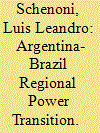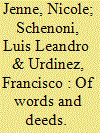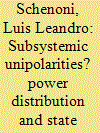| Srl | Item |
| 1 |
ID:
162769


|
|
|
|
|
| Summary/Abstract |
Almost four decades have passed since the Argentina-Brazil balance of power gave way to a Brazilian uncontested primacy in the Southern Cone. The peaceful and cooperative nature of this regional power transition poses an interesting puzzle for structural theories and those concerned with the US-China transition. Why do certain countries accept accommodation more leniently, like Argentina did? I offer an explanatory model and use process tracing to show that key cooperative turns in this bilateral relationship—during the late 1970s and early 1990s—required concurrent structural changes, both at the international and domestic levels. My conclusions suggest, against the prevalent narrative, that cooperation between Argentina and Brazil was not a product of democracy. Instead, peaceful power transitions take place when the costs of confrontation are high and social coalitions are largely redefined in the declining state.
|
|
|
|
|
|
|
|
|
|
|
|
|
|
|
|
| 2 |
ID:
157531


|
|
|
|
|
| Summary/Abstract |
The idea of an integrated Latin American region goes back to the early post-independence period, and yet, in substance, Latin American regionalism has remained far behind its stated aims. The perceived implementation gap has raised the question why policymakers continued to talk about something they appeared to avoid in practice. This article contributes to the debate on Latin America’s integration gap by exploring the phenomenon of declaratory regionalism - the practice of referring to the region and its institutions in political speeches. Based on quantitative text analysis of the speeches presidents delivered annually at the UN’s General Assembly between 1994 and 2014, we show that this practice has not been uniform. Presidents distinguish between different forms of regionalism, integration and cooperation, and frame the geographical region they refer to accordingly. In motivating presidents to speak about integration as opposed to cooperation, ideology and democratic performance stand out as crucial factors.
|
|
|
|
|
|
|
|
|
|
|
|
|
|
|
|
| 3 |
ID:
148957


|
|
|
|
|
| Summary/Abstract |
This article explores the possibility of conceiving South America and Southern Africa as subsystemic unipolarities under Brazilian and South African primacy, respectively. It argues that this concept, when applied to these regions, sheds light not only on the long-term strategies behind the Brazilian and South African foreign policies towards their neighbourhood, but also on the behaviour of secondary regional powers and small states. This hypothesis questions the maxim that considerations related to polarity affect great powers only. After examining the Brazilian and South African cases, the author undertakes a comparative analysis of 17 countries in these regions, showing that the behaviour of politically stable countries in these regions is as predicted by theories of unipolarity.
|
|
|
|
|
|
|
|
|
|
|
|
|
|
|
|